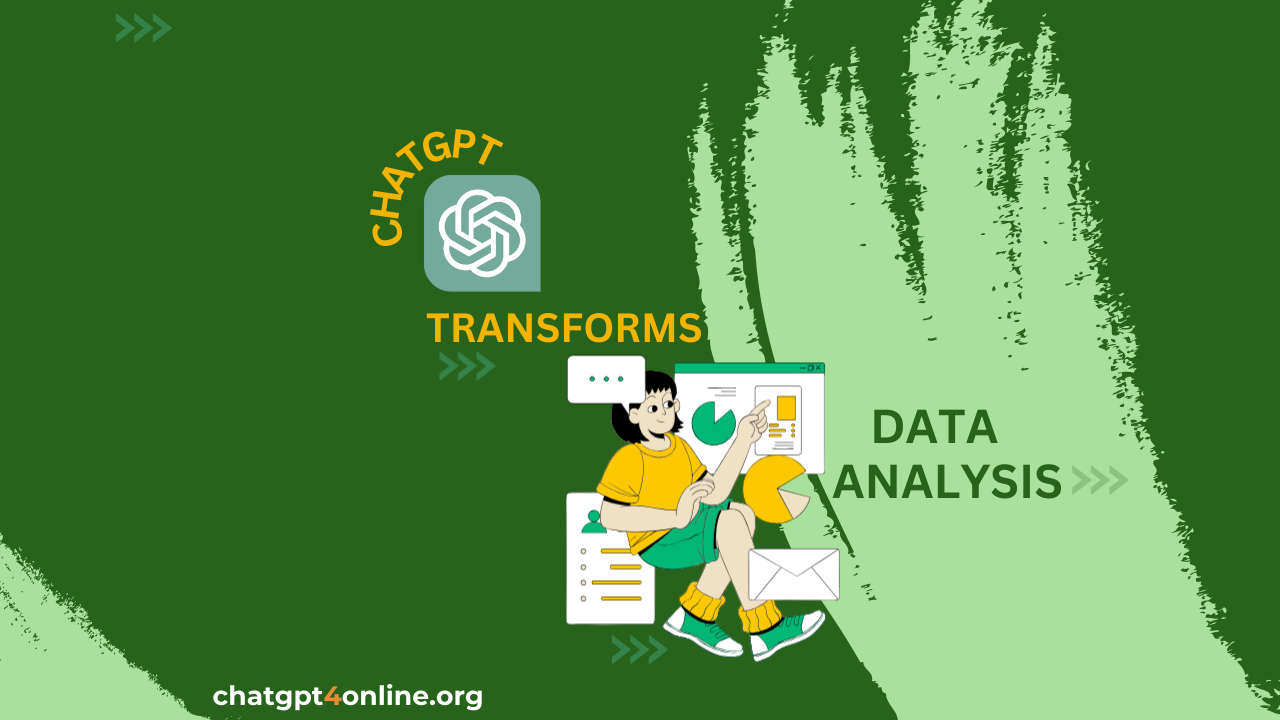ChatGPT 4 For Data Analysis: Practical Business Uses
In today’s fast-paced business landscape, using data to make informed decisions is crucial for success. However, traditional data analysis methods often fall short in handling the vast amounts of data generated by modern businesses. This is where ChatGPT and ChatGPT 4 for data analysis come into play.
ChatGPT 3.5 and 4, advanced AI models developed by OpenAI, offer a transformative approach to data analysis for businesses. Unlike conventional methods, ChatGPTs are equipped to understand and process large volumes of data quickly and efficiently.
In this article, we will explore how ChatGPT 3.5 and ChatGPT 4 transform data analysis for businesses, enabling them to unlock valuable insights that drive informed decision-making. Let’s delve into the role of ChatGPTs in transforming data analysis processes and how they empower businesses to stay ahead in today’s competitive market.

Before going into how ChatGPT models can be utilized to transform data analysis for business, it’s important to consider that only by using ChatGPT 4 with a subscription plan, the tasks of data analysis for your business can be performed effectively. With ChatGPT 4, you can access this AI tool’s ability to browse the internet or to access the latest info or trends.
Actionable Insights of ChatGPT 4 for Data Analysis in Business
ChatGPT’s versatility allows it to be applied across a wide range of industries, enabling businesses to derive actionable insights from diverse data sources. Here’s how ChatGPT 4 Online facilitates the extraction of actionable insights across various sectors within the following industry-specific examples:
ChatGPT 4 for Data Analysis in the Retail Industry
In the retail sector, ChatGPTs offer a plethora of opportunities for extracting actionable insights from diverse data sources. Here’s how ChatGPTs can be used within the retail industry for data analysis:
Customer Sentiment Analysis
A retailer (for example, a clothing retailer) can use ChatGPT 4 for data analysis to analyze customer reviews on social media platforms and identify common themes such as product quality, sizing issues, or delivery experiences.
By identifying recurring issues and sentiments, the retailer can take proactive measures to address customer concerns, such as improving product descriptions, optimizing inventory management, or enhancing delivery logistics.
Demand Forecasting and Inventory Management
ChatGPTs can analyze sales data, market trends, and external factors such as weather patterns or seasonal events to forecast demand and optimize inventory levels.
A retailer (for example, a grocery retailer) can use ChatGPTs to analyze historical sales data and external factors such as weather forecasts to predict demand for perishable goods like fruits and vegetables.
Based on the demand forecast, the retailer can adjust ordering quantities, optimize shelf space allocation, and minimize food waste by stocking the right amount of inventory.
Personalized Marketing and Product Recommendations
An e-commerce retailer can use ChatGPT 4 to analyze customer browsing behavior and past purchase history to recommend relevant products to each customer.
For instance, if a customer has previously purchased running shoes, ChatGPT can suggest complementary products such as athletic apparel or fitness accessories, increasing the likelihood of a repeat purchase.
Competitive Intelligence and Market Analysis
A retail chain can use ChatGPT 4 for data analysis in order to analyze competitor websites and pricing data to benchmark their prices against competitors and identify opportunities for price adjustments or promotions.
By staying informed about competitor pricing strategies and market trends, the retailer can make data-driven decisions to remain competitive and maximize profitability.
As you know effective prompting is quite essential to get customized responses from ChatGPTs, I’ve composed ChatGPT Prompts for Business, specifically designed keeping in view specific business requirements
ChatGPT 4 for Data Analysis in the Financial Services Industry
The Financial Services industry encompasses a wide range of sectors including banking, investment, insurance, and wealth management. ChatGPTs can play a significant role in each of these areas by providing valuable insights and analysis.
Here’s how ChatGPTs can be utilized within the Financial Services industry:
Market Sentiment Analysis
ChatGPT 3.5 and ChatGPT 4 can analyze news articles, social media discussions, and market reports to gauge investor sentiment and identify market trends. For example, an investment firm can use ChatGPTs to analyze news articles and social media discussions related to a specific stock or sector.
By identifying prevailing sentiment trends, such as positive or negative sentiment towards a particular company, the investment firm can adjust its investment strategy accordingly, either by increasing or decreasing exposure to that stock.
Risk Management and Compliance
A bank can use ChatGPT 4 to analyze regulatory filings and compliance reports to identify potential areas of non-compliance with regulatory requirements.
By flagging compliance issues early on, the bank can take corrective actions to address these issues and avoid regulatory penalties or reputational damage.
Investment Research and Portfolio Optimization
ChatGPT 4 can analyze financial statements, earnings reports, and economic indicators to conduct investment research and optimize investment portfolios.
A wealth management firm can use ChatGPT to analyze financial data and economic indicators to identify investment opportunities in various asset classes.
By using ChatGPT’s insights, the firm can construct diversified investment portfolios tailored to each client’s risk tolerance, investment objectives, and financial goals.
Customer Service and Support
ChatGPT 4 for data analysis can analyze customer inquiries, support tickets, and service requests to provide personalized customer service and support.
A retail bank can use ChatGPTs-powered chatbots, like ChatGPT 4 Online, to handle customer inquiries and help with common banking transactions, such as account balance inquiries, fund transfers, or loan applications.
By offering 24/7 support and resolving customer issues promptly, the bank can improve customer satisfaction and loyalty while reducing operational costs
ChatGPT for Data Analysis in the Hospitality Industry
In the hospitality sector, providing exceptional guest experiences is paramount to success. ChatGPTs can play a pivotal role in enhancing guest satisfaction, optimizing operations, and driving revenue growth.
Here’s how ChatGPTs can be leveraged within the Hospitality Industry:
Guest Feedback Analysis
A hotel chain can use ChatGPT 4 for data analysis to analyze guest reviews from online platforms such as TripAdvisor or Booking.com.
By identifying recurring themes and sentiment trends in guest feedback, the hotel can pinpoint areas for improvement, such as service quality, cleanliness, or amenities, and take proactive measures to address guest concerns.
Revenue Management and Pricing Optimization
ChatGPT 4 can analyze booking data, market trends, and competitor pricing to optimize room rates and maximize revenue.
By using ChatGPTs’ predictive analytics capabilities, hotels can adjust pricing strategies dynamically based on demand fluctuations, seasonal trends, and competitor actions.
A hotel revenue manager, for example, can use ChatGPTs to analyze historical booking data and market demand forecasts to optimize room rates for different room types and booking channels. By implementing dynamic pricing strategies, the hotel can maximize revenue per available room (RevPAR) and optimize occupancy levels throughout the year.
If you’re a programmer or learning a coding language, use our ChatGPT Coding Prompts to get customized responses.
Personalized Guest Services
ChatGPTs can analyze guest preferences, past interactions, and demographic information to provide personalized recommendations and services. By delivering tailored experiences to individual guests, hotels can enhance guest satisfaction, loyalty, and repeat business.
A luxury resort, for instance, can use ChatGPTs-powered virtual assistants to provide personalized recommendations for dining options, spa treatments, and recreational activities based on guest preferences and interests.
By offering customized experiences that cater to each guest’s preferences, the resort can create memorable stays that encourage repeat visits and positive word-of-mouth referrals.
Operational Efficiency and Staff Training
A hotel can use ChatGPT 4 to analyze guest service inquiries and common operational issues reported by staff to identify areas for process improvement.
By streamlining check-in procedures, housekeeping workflows, or maintenance requests, the hotel can enhance operational efficiency and staff productivity, leading to improved guest experiences.
ChatGPT 4 for Data Analysis in the Transportation and Logistics Industry
In the Transportation and Logistics sector, efficiency, accuracy, and timeliness are crucial for success. ChatGPT can play a pivotal role in optimizing operations, improving delivery performance, and enhancing customer satisfaction.
Here’s how ChatGPT can be utilized within the Transportation and Logistics Industry:
Route Optimization and Logistics Planning
A logistics company can use ChatGPTs to analyze historical delivery data and traffic patterns to optimize delivery routes for its fleet of vehicles.
By considering factors such as traffic congestion, road conditions, and delivery priorities, ChatGPTs can recommend the most efficient routes for each delivery, reducing transit times and improving on-time delivery performance.
Supply Chain Visibility and Inventory Management
ChatGPT can analyze supply chain data, inventory levels, and demand forecasts to provide real-time visibility into supply chain operations and optimize inventory management.
A retail distribution center can use ChatGPTs to analyze inventory levels and demand forecasts to optimize inventory replenishment schedules.
By accurately predicting demand for specific products and adjusting inventory levels accordingly, the distribution center can reduce stockouts, minimize excess inventory, and improve overall inventory management efficiency.
Freight Rate Optimization and Cost Management
A freight brokerage firm can use ChatGPTs to analyze freight rate data and shipping requirements to match shippers with carriers offering the most competitive rates.
By using ChatGPTs’ insights, the brokerage firm can negotiate favorable contracts with carriers, optimize freight routes, and reduce transportation costs for its clients.
Customer Service and Delivery Tracking
ChatGPTs can analyze customer inquiries, delivery tracking information, and service requests to provide real-time customer support and delivery updates.
A parcel delivery company can use ChatGPT-powered chatbots to handle customer inquiries and provide delivery status updates in real-time.
By offering 24/7 support and proactive communication with customers, the delivery company can improve customer satisfaction and loyalty while reducing operational costs.
You can also explore all the other benefits of ChatGPT for Business.
Overcoming Challenges When Using ChatGPTs for Data Analysis
While ChatGPTs offer significant potential for transforming data analysis and decision-making, businesses may encounter challenges and limitations in their implementation.
Here’s how to address and overcome these obstacles effectively:
Data Quality and Bias
One challenge is ensuring the quality and reliability of the data used to train and feed ChatGPT 3.5 and 4 models or chatbots. Biases present in the training data can lead to biased outputs and flawed decision-making. Businesses must implement rigorous data quality control measures and regularly audit ChatGPTs’ outputs to identify and mitigate biases effectively.
Interpretability and Explainability
Another challenge is the lack of interpretability and explainability of ChatGPTs’ outputs. The black-box nature of deep learning models can make it challenging to understand how ChatGPT models arrive at their conclusions.
Businesses must invest in tools and techniques for interpreting and explaining ChatGPTs’ outputs to stakeholders, ensuring transparency and trust in decision-making processes.
Security and Privacy Concerns
Deploying ChatGPT in sensitive business environments raises security and privacy concerns. Businesses must implement robust security protocols and data protection measures to safeguard sensitive information processed by ChatGPT.
This includes encryption, access controls, and regular security audits to protect against unauthorized access and data breaches.
Regulatory Compliance
Compliance with regulations such as GDPR, CCPA, and industry-specific regulations poses another challenge for businesses using ChatGPT.
Businesses must ensure that ChatGPT’s usage complies with relevant data protection and privacy regulations, including obtaining the necessary consent from users and implementing mechanisms for data deletion and consent management.
Final Thoughts
From customer sentiment analysis to demand forecasting, ChatGPTs when used for data analysis offer a myriad of applications across various industries, including retail, financial services, hospitality, transportation, and logistics.
By utilising ChatGPT 3.5 or ChatGPT 4 for data analysis, businesses can streamline processes, improve efficiency, and deliver superior experiences to customers and stakeholders.
ChatGPTs hold immense potential to transform data analysis for businesses across industries. By harnessing the power of ChatGPTs, businesses can unlock new opportunities, mitigate risks, and achieve their strategic objectives in an increasingly data-driven world.
Albert Haley
Albert Haley, the enthusiastic author and visionary behind ChatGPT 4 Online, is deeply fueled by his love for everything related to artificial intelligence (AI). Possessing a unique talent for simplifying complex AI concepts, he is devoted to helping readers of varying expertise levels, whether newcomers or seasoned professionals, in navigating the fascinating realm of AI. Albert ensures that readers consistently have access to the latest and most pertinent AI updates, tools, and valuable insights. Author Bio


